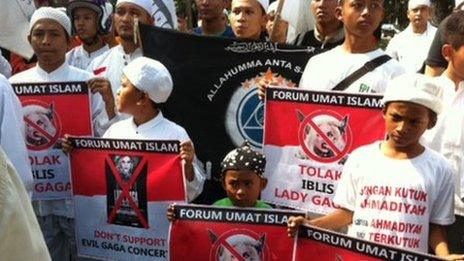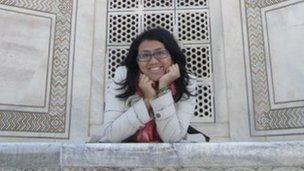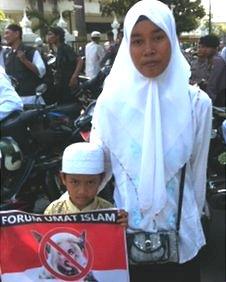Is Indonesia becoming less tolerant?
- Published

Lady Gaga's concert was cancelled after protests in Jakarta
Indonesian account manager Putri Nuraini, 28, is devastated. She had been praying that US pop star Lady Gaga's show would go ahead as planned.
But on Sunday, the performer's management team called off the show, citing security concerns after hardline Islamic groups threatened to cause "chaos" if she entered the country.
Putri says she does not understand why Islamic groups are so against Lady Gaga.
"I'm a Muslim myself - but I don't get what their point is," she says heatedly. "It just doesn't make sense. Is Lady Gaga going to make love on the stage? No, she's going to perform. It's ridiculous."
But her sentiments are not shared by Effie and her nine-year-old son, Ade.
At an anti-Lady Gaga rally organised by conservative Islamic groups, little Ade was busy carting around a poster almost as big as his body with the words Reject the Devil Lady Gaga emblazoned on it.
"I've been bringing him to these sorts of protests since he was in my womb," his proud mother said. "It is good for him as a young Muslim to stand up for his faith."
I asked her why she was so incensed by a pop star - if she didn't like the music, then surely she didn't have to go to the concert? Why not let other Indonesians enjoy the event?
"Everyone always says Indonesian Muslims are so tolerant," the young mother said firmly. "We are, but we also don't want to be stepped on all the time. We have to stand up for Islam."
'Paltry sentences'
The Lady Gaga fiasco is just the latest in a series of incidents that observers say shows a rising trend of religious intolerance in Indonesia.
Indonesia is the world's most populous Muslim nation but it is also secular.
It has a long tradition of religious tolerance enshrined in its constitution and has been held up by the West as a democratic blueprint for other Muslim countries in the Middle East.
But recently small groups of Islamic hardliners have become increasingly vocal in Indonesia - and there are concerns that the government is not doing enough to stop them.
The fear is that Indonesia is slowly sliding down the tolerance tables, and that the hardliners are getting the upper hand.

Putri Nuraini says the attitude of 'hardliners' towards the concert is ridiculous
That is what Irshad Manji, a Muslim reformist and a feminist, believes.
She and her team were attacked by Islamic hardline groups while they were on a book tour of her newest book, Allah, Liberty and Love, in Indonesia. One of her colleagues ended up in hospital with an arm injury.
"They [the Islamic hardliners] arrived with helmets and masks hiding their faces, swashbuckling with iron rods and batons," Irshad said. "They not only trashed property but also sent several people to hospital, my colleague among them."
"We didn't receive any help from the authorities," she continued, visibly incensed. "Many Indonesians have told me they feel they can't report intimidation and thuggery because no one is going to do anything about it at the highest level.
"If they do report it, then they'll be on the receiving end of the violence. If they don't - then the violence continues. So frankly, what is supposed to be a pluralistic state is going in the direction of Pakistan - rather than in the direction of real democracy."
Intolerance unchecked
It is a worry many observers of Indonesian politics share.

Effie argues that while her country is tolerant, Islam cannot be trampled on
"In August 2011, three churches were burned in Sumatra," wrote Andreas Harsono of the New York-based Human Rights Watch in a recent editorial entitled No Model for Muslim Democracy in the New York Times.
"No one was charged for that. In the deadliest attack last February, three Ahmedis men were killed. A court eventually prosecuted 12 militants for the crime - but handed down paltry sentences of only four to six months."
Human rights groups fear religious intolerance in Indonesia is going unchecked.
"There's now a religious intolerance case almost every day in Indonesia," Bonar Naipospos, a researcher with the Setara Institute, said.
"There's been a marked increase in cases over the last decade. The government doesn't do anything about it because it is worried about losing the Muslim vote. Even though the majority of Indonesian Muslims are moderate - they are the silent majority. If we don't fix this we could go from being a moderate country to one dominated by extremists."
But the Indonesian government rejects this criticism.
In an interview with the BBC, Foreign Minister Marty Natalegawa defended his government's position vehemently.
"One such incident is one too many," he told me. "But the overwhelming situation is not what you have described. Indonesia is now a very democratic and open society... We remain strongly committed to the promotion of religious tolerance."
"And on the kind of incidents that you have stated - I will be categorical and clear - these kinds of actions have no place whatsoever. We condemn it totally and completely."
But critics say this verbal condemnation does not go far enough.
Indonesia was founded on a pluralistic philosophy - the national motto of the country is Unity in Diversity.
But inaction by the government means this country - once a beacon of tolerance in the region - runs the risk of losing that reputation and in the process damaging the very foundations it was built on.
- Published28 May 2012
- Published26 October 2011
- Published9 August 2010